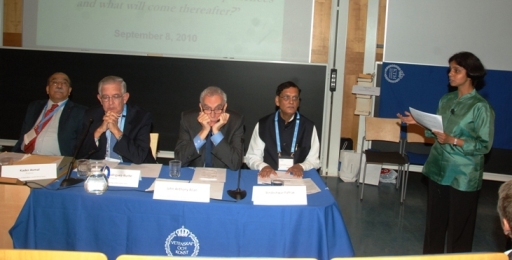Stockholm Water Prize Laureates Seminar
– 20 years of water management experiences and what will come thereafter?

Wednesday 8 September 2010
Lecture Hall Q1, 09.00 (sharp) – 12.00
Osquldas väg 4
This year it is 20 years since the first global water prize was launched at the World Water Week in Stockholm. KTH has the privilege to arrange an open seminar with some 20 of the prize winners on three much debated themes:
A new future for public water supply management?
Stockholm Water Symposium has undergone several phases. In the 1990s the inclusion of the private sector in water supply management was very much in focus, even the righteous take over of water facility assets was favoured. In the Johannesburg conference 2002 private sector participation was adopted as an overall management principle. But in recent years public water supply management has resumed interest again. This is also partly due to the financial and economic crisis. In Sweden most professional agree that public water management has been quiet efficient and favourable for the consumers. The World Bank and the European Union have gradually taken initiatives to support public-public management in international collaboration. Will there come a new era of public water supply and what will it look like?
Is water governance really promoting a democratic participation and development?
When Stockholm Water Symposium was set up in the early 90s few had heard of the concept of water governance. There were no theses written about it at KTH. Now we have several. But gradually during the course of the symposium water governance has been advocated by the international financial and water communities as a panacea to solve all the current water management problems. This has become more and more contested by researchers from various fields. Will the consensus between organizations of different strength, which is the decision-making method of water governance, really promote democratic participation and development?
Aren’t there enough water resources available, so everybody on this planet can enjoy the right to water?
If not explicitly, but indirectly various UN conventions state that access to water is a human right. The implication of this is that everybody should have the social right to water that is safe for human consumption, and that the allocation of water for personal and domestic use should have the first priority. Especially after the Millennium shift at the Stockholm Water Symposium this right has been contrasted with the Dublin principle of water as an economic right. One pretext not to take enough action to provide water as a human right is that the water is not physically available. However, in most cases water is physically present, but not available due to misallocations, politics, corruption or lack of investment capacity. Also, sometimes even after safe water has been made available, access to the right is hampered due to people’s own social and cultural contexts. After the trillions of US dollars that governments have used to bail out banks and financial institutions can it be argued any longer that money is missing? Are there not enough technical infrastructures to ensure adequate supply of safe water? Or is there a lack of sensitization and responsible behaviour on part of different stakeholders?
Very welcome
Jan-Erik Gustafsson Nandita Singh
Associate professor Senior Researcher
KTH – Land and Water Resources Engineering, Teknikringen 76, 1fl, SE-100 44 Stockholm, Sweden
Tel: +46 8 7907359, Fax: +46 8 4110775
e-mail: janerik@kth.se

